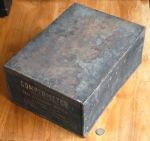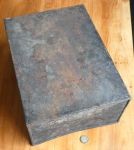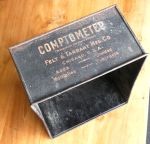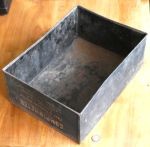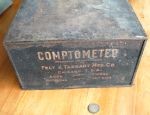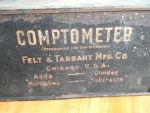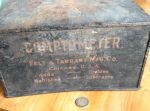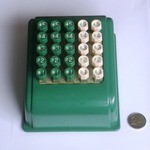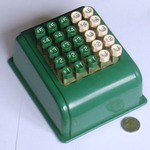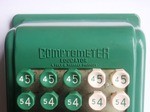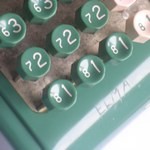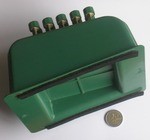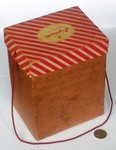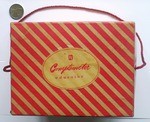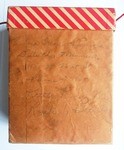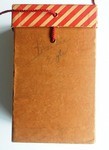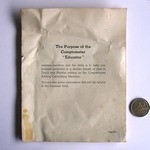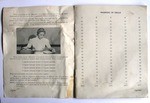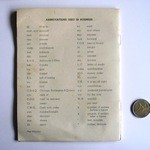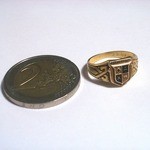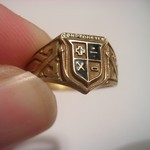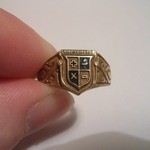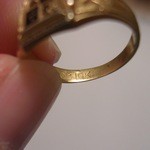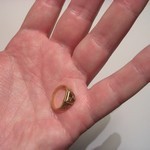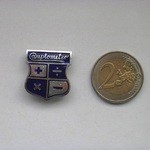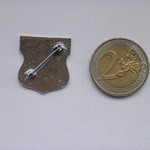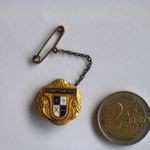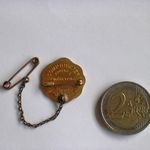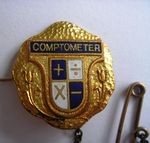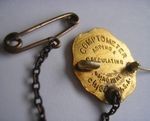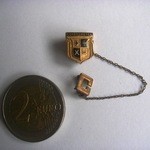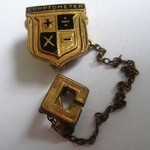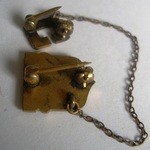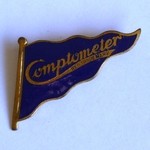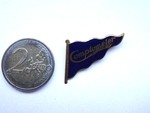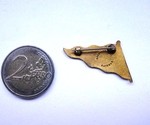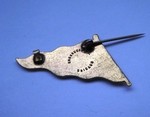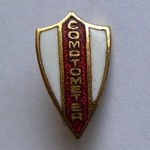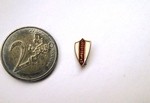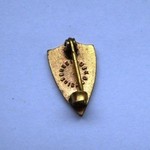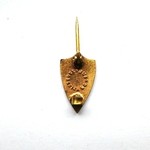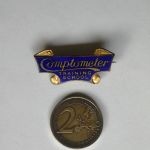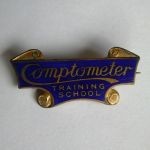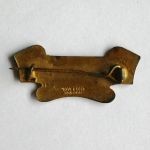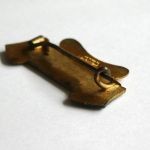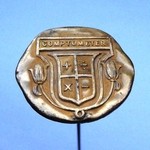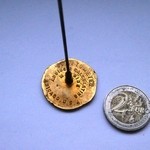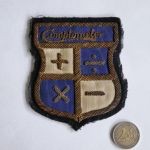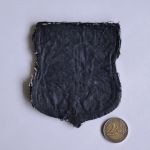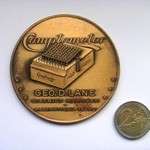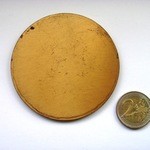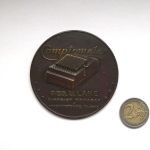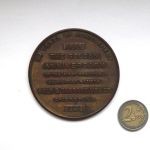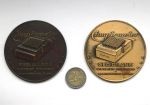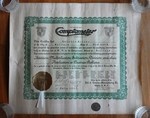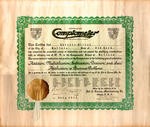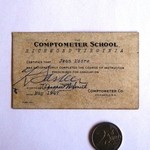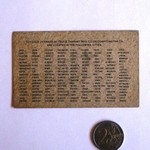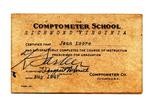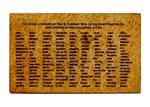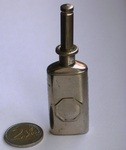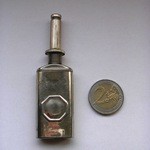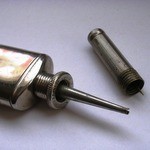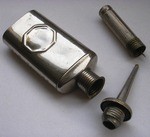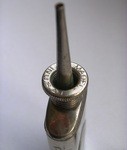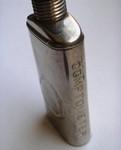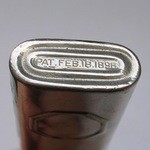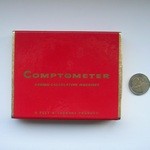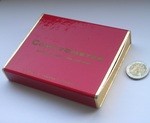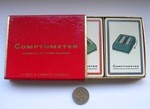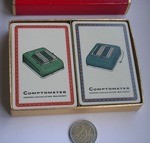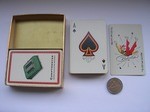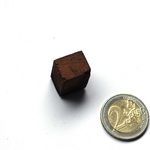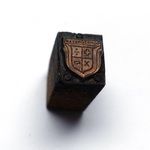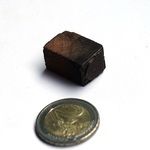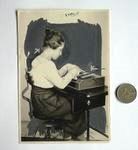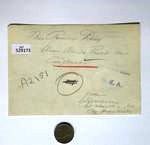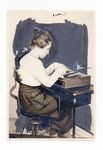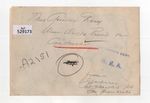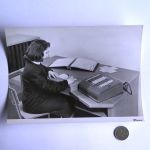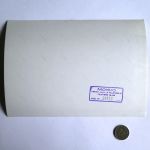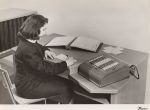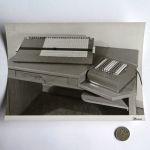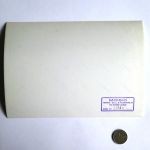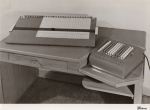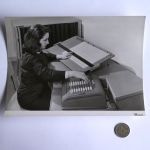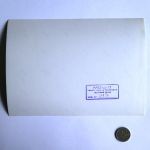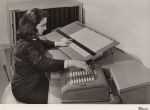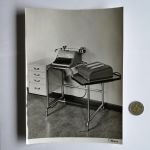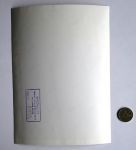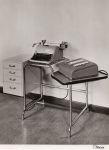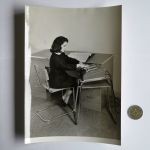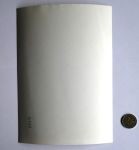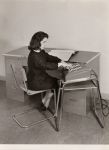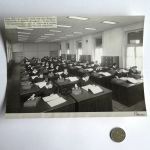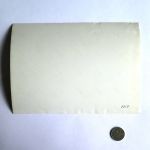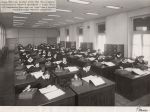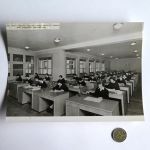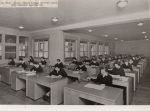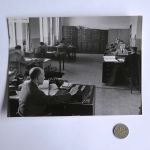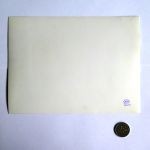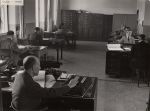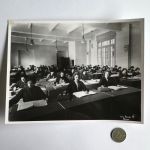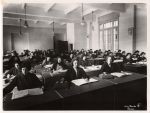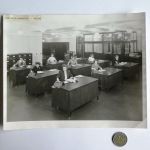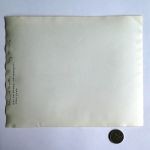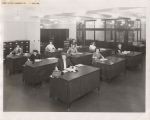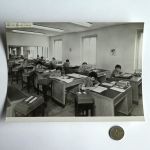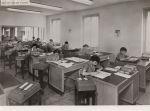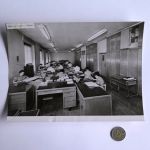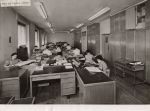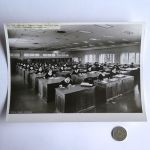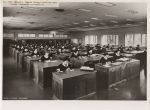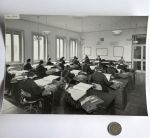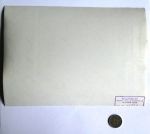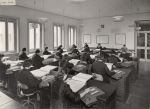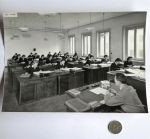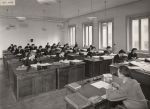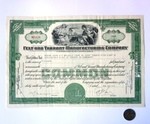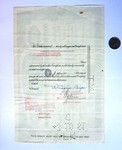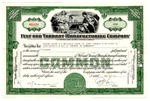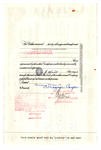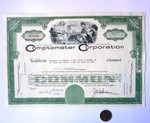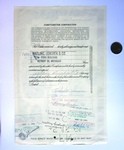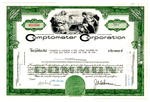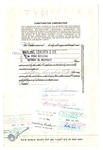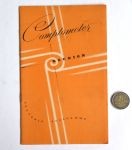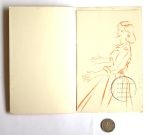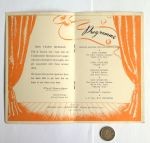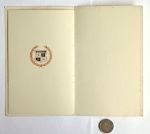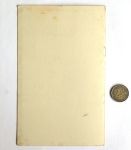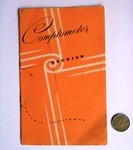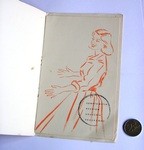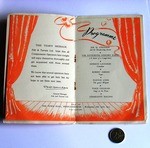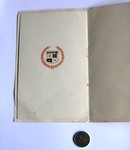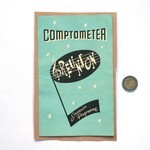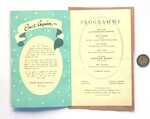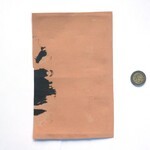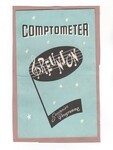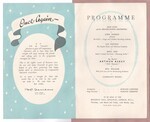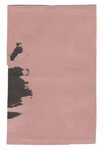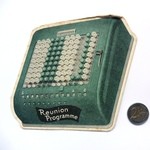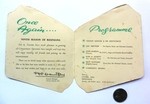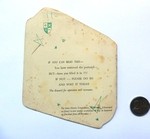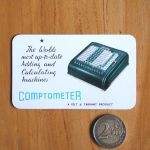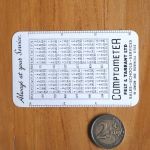- Home /
- Mechanical Calculators /
- Comptometer /
- Paraphernalia
Comptometer Paraphernalia
Comptometer Dust Cover
Comptometer Educator
Comptometer Ring
Comptometer Badges
Comptometer Hat Pin
Comptometer Patch
Comptometer Medal
Comptometer School Diploma
Comptometer School Certificate
Comptometer Oil Can
Comptometer Oil
Comptometer Playing Cards
Comptometer printing block
Newspaper photograph
Italian Photographs
Share certificate Felt and Tarrant Manufacturing Company
Share certificate Comptometer Corporation
Comptometer Reunion Souvenir Programme
1954 Comptometer Calendar
Comptometer Dust Cover
This metal box is open at the bottom, and would be used to cover the Comptometer
when not in use. They seem to have been supplied with the model A until at least the
model E, but considering how rare these covers are, it seems unlikely that they were
supplied as standard with the model F and later. It could be that they were an
optional extra that most users did not take. This particular box is in fairly poor
condition, but the lettering is still fully readable:
COMPTOMETER
(Pronounced like thermometer)
Felt & Tarrant Mfg. Co.
Chicago, U.S.A.
Adds ── Divides
Multiplies ── Subtracts
It's width is such that it covers a 10-column machine.
Comptometer Educator
Comptometer Ring
Finger rings like this one were awarded to operators who performed exceptionally well during
training at a Comptometer school, or during their later employment.
It is marked OB10K, which means that this ring is made of 10 karat gold. OB is the maker's
mark, which stands for Ostby & Barton, a reknowned jeweller's specialising in rings. The ring
depicts a shield with the four arithmetic operators on it, and the word Comptometer along its top.
Comptometer Badges
These Comptometer badges were probably awarded to a Comptometer operators for the same
reason as the Comptometer finger ring above - exceptional achievement during training at a
Comptometer school, or during their later employment.
This second badge has an extra pin attached to it by chain, which seems to have been added later by the
original owner to make sure it will not accidentally come loose and be lost. This shows just
how highly valued the badge was.
This third badge is very small, similar in design to the decoration on the gold ring above.
Like the previous badge it has a safety chain, but this is original rather than a later
addition. The extra pin on the chain is in the shape of the letter C.
This Comptometer badge is in the shape of a flag or pennant. It was made by the Greenduck Metal Stamping Company, Chicago.
This tiny Comptometer badge is in the shape of a shield. It was made by the Greenduck Metal Stamping Company, Chicago.
This badge is for the Comptometer Training School. It was made by Tove & Co. Ltd, London.
Comptometer Hat Pin
This is a hat pin, and on its head is a large comptometer shield. It was made by the Greenduck Metal Stamping Company, Chicago.
Comptometer patch
This is an embroidered patch which presumably was once part of a uniform or jacket. It is in the shape of the Comptometer shield.
Comptometer Medals
This is a medal awarded to George D. Lane, the district manager for Washington D.C..
He also wrote the 1934 booklet "Comptometer Peg-board Methods".
It is not clear when the medal was made, but as it depicts the model H or J,
it presumably dates from the period 1920-1934.
This second medal, also awarded to George D. Lane, is the same on the front.
The back celebrates the golden anniversary of the Comptometer, 1886-1936, so
presumably it was awarded in 1936.
Comptometer School Diploma
This Comptometer School Diploma was awarded in July 1927 to Estelle Miller of Buffalo N.Y.
for completing the training at the Buffalo Comptometer School. An interesting feature of the
diploma is that it explicitly states that it entitles the bearer to the services and
privileges of any Felt & Tarrant Comptometer school, which presumably means that
anywhere in the US the local Comptometer school can help find a job placement.
Comptometer School Certificate
This Comptometer School Certificate was awarded in May 1947 to Jean Moore for
completing the training at the Comptometer School in Richmond Virginia. It is a far
less elaborate affair than the diploma above, and about the size of a credit card so
it is easy to carry along to a job interview.
Comptometer Oil Can
For a while Comptometers were sold with this small oil can so that the operator could
keep it in good condition. The lid screws tight and has a pick inside it for oiling small
parts. The rim around the spout is marked "MADE IN U.S.A.", the sides say
"COMPTOMETER", and the bottom is marked "PAT.FEB.18.1896". This refers
to patent US 554,941 by John Lines
which describes the oil can. The most innovative part is that the bottom and sides are
pressed from one piece of metal so that there is no seam at the bottom for the oil to
leak out of.
Comptometer Oil
Felt & Tarrant Mfg. Co.
Form 265, 453
This is an unused bottle of non-gumming Comptometer oil. Amazingly, the bottle's label has its
own Form number. It comes in a cylindrical storage box, which is made of cardboard but with a metal
base, rim and screw top. The bottom is stamped with the words "Improved Mailing Case Co / Makers /
New York". The box has a label with instructions for oiling the model H, F, and C, which read as
follows:
DIRECTIONS FOR USE
The Controlled Key Zero-Signal Comptometer, Model H
Copyright, November, 1919, by Felt & Tarrant Mfg. Co.
If the machine is used only once or twice a week, oil once every three months.
If used regularly eight hours a day by a rapid operator, oil each Monday morning.
1. Set the machine on a level desk and put three drops of oil in each oil hole
back of the 9 keys.
2. Clear machine; strike 8-key in the units column. Put eight or ten drops
of oil in the oil hole under the 1 key in that column; also in the oil hole in the
face-plate between the units and tens columns below where the answer shows,
after pressing back the spring that closes the oil hole. Operate the 9-key twenty
or thirty times.
Clear machine; Set up 8 on the register in the tens column. Put eight or ten
drops of oil in the oil hole under the 1 key in the tens column; then in the oil
hole in the face-plate between the tens and hundreds column. Operate the 90-key
twenty or thirty times. Repeat for each column.
3. Pull forward the zero crank and put three drops of oil in each hole on the
right side of the key plate near the front and work zero crank back and forth. Then
with crank in normal or rearward position put another drop of oil in the rear
one of the two holes.
The Controlled Key Duplex Comptometer, Model F
Copyright, 1916, by Felt & Tarrant Mfg. Co.
If used only an hour or two a week, oil once every three months. If used
regularly eight hours a day by a rapid operator, oil on the first and fifteenth
days of each month, except see Note in the following paragraph.
1. Set the machine on a level desk and put a drop of oil on the release key
stem and then put three drops of oil in each oil hole back of the 9 keys.
Note:- Pay special attention to the three holes nearest the release key on
the right; also the three holes nearest the left side of the machine. These six
holes should have a little oil once a week.
2. Cancel. Strike the 8-key in the units column. Put eight or ten drops of
oil in the oil hole under the 1 key in that column; also in the oil hole in the face
plate between the units and tens columns below where the answer shows, after
pressing back the spring that closes the oil hole. Operate the 9-key twenty or
thirty times.
Cancel. Set up 8 on the register in the tens column. Put eight or ten drops
of oil in the hole under the 1 key in the tens column; then in the oil hole in
the face plate between the tens and hundreds columns. Operate the 90-key twenty
or thirty times. And so on across the machine.
The Duplex Comptometer, Model C which has oiler tubes in the front
If used only once or twice a week, oil once every three months. If used regularly
8 hours a day by a rapid operator, oil on the first and fifteenth days of each
month.
1. Set the machine on a level desk and put three drops of oil in each one
of the holes near the row of 9-keys and in the hole near the 6-key.
2. Set up 8's on the register and then put three drops of oil in each of the
oil holes under the row of 1-keys.
3. Put three drops of oil in each of the oil holes just under where the answer
shows.
Remember that unless the Comptometer is regularly and properly oiled, it will
work hard and will not last; but it would be better not to oil at all than to use
an oil that will gum up on delicate mechanism.
Form 265 Printed in U.S.A.


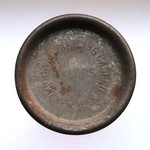
Box of Comptometer Playing Cards
This is a box with two packs of cards. The back design on the red pack depicts the final
mechanical model, the 3D11 from 1950. The blue pack shows the model 992 which is the equivalent
electrical model.
Comptometer printing block
1900-1930
12mm × 15mm × 23mm
This is a printing block for use in letterpress printing. It has the
image of a shield with the four arithmetic operators on it and COMPTOMETER
along the top, in mirror image of course. I do not know where this block
was used, as I have not found any newspaper or magazine adverts containing
this image. Larger versions of this shield were often used in manuals, and
can also be seen on pins and rings.
Newspaper photograph
1918
120mm × 172mm
This is a photographic print which has been touched up in preparation for being printed in
a newspaper article. It depicts a woman behind a model F comptometer, and the background has been
inked black, some folds on her blouse have been accentuated with black lines, and some white lines
have been drawn along the edges of the Comptometer. On the back of the photo is the
text "Genevievs Deasy, Winner World Record Comptometer". This is the same Genevive Deasy
who is mentioned on page 18 of the February 1927 issue of Comptometer News (Vol. 1 No. 2) as
being in charge of the Comptometer Bureau of the Southern Pacific Company. The back of the photo
also says "from J J Morris[?], 65 Market St., San Francisco", which is the address of
the Southern Pacific Railway Company. The company moved into that
building in 1917.
I have found the newspaper article from April 1918 in which this photo was used. Genevieve
Deasy won a prize for setting the world speed record for calculations on the Comptometer.
Italian Photographs
1945-1955
120mm × 172mm
This is a set of photographs intended for use in promotional material. They were mostly
made in Italy. The first 5 photographs show a Comptometer 992, a pegboard, and special
furniture for the Comptometer, and feature a woman demonstrating their use.
The remaining photographs show the Comptometer being used at various companies in
Italy. They mostly feature the Super Totalizer version of the model M. It is probable
that there was an Italian assembly plant that specialised in making the model M Super
Totalizer.
Share certificate Felt and Tarrant Manufacturing Company
18-03-1949
303mm × 201mm
Share certificate Comptometer Corporation
30-03-1951
305mm × 204mm
Comptometer Reunion Souvenir Programme (PDF, 2.25 MB)
Felt & Tarrant Ltd.
October 1950
8-page leaflet
126mm × 202mm
Reunions were held every year for British Comptometer operators. The fifth season
comprised reunion events at about 20 different locations around the country, allowing
allowing operators from every part of the country to attend. It ran from September 1950
until April 1951. This is the programme for the reunion held on the 9th of October 1950
in Manchester. The evening's entertainment was music by Vernon Adcock and his Aristocrats,
cartoonist Jack Crosbie ("Quick on the Draw"), comedian Cyril Fletcher, baritone
Donald Munro, entertainer
Max Bygraves,
and ended with some community singing with Hal Chambers at the piano.
Comptometer Reunion Souvenir Programme (PDF, 1.49 MB)
Felt & Tarrant Ltd.
April 1951
8-page leaflet
126mm × 202mm
This is another programme for the fifth season of reunions for British Comptometer
operators. This one was held on 18th April 1951 in Middlesborough.
The evening's entertainment was Jos Q. Atkinson and his Broadcasting Sextet, comedian
Norman Laughlin, the tenor Robert H. Gibson, the magician Paxton Lynn ("The genial
Wizard"), songs at the piano by Vince Gilligan, and ended with some community singing.
You can find pictures online of yet another reunion programme from this season,
namely for the reunion on the 19th and 20th of April 1951 in Newcastle-on-Tyne:
photo 1,
photo 2.
Comptometer Reunion Souvenir Programme
Felt & Tarrant Ltd.
March 1953
4-page folded leaflet
123mm × 198mm
This is a programme or the 8th season of annual reunions for British Comptometer
operators.
This reunion was held on the 19th and 20th of March, 1953, in London.
The evening's entertainment had music by Jack Leon &
his Broadcasting Orchestra, singing by John McHugh (tenor), comedy by
Jon Pertwee
(best known for becoming the third Doctor in Doctor Who, he was a popular comedian before that),
and by Beryl Reid,
the headline act was the comedian
Arthur Askey,
and the evening ended with a performance by the singer Rita Williams, and then
some community singing.
Comptometer Reunion Programme
Felt & Tarrant Ltd.
September 1953
4-page folded card
125mm × 133mm
The 9th season of annual reunions for British Comptometer operators ran from 25th of September 1953
till the 30th of April 1954 and took place in only 10 locations in the country. This is the invitation and
programme for the one held on 5th October 1953 in Birmingham. The evening's entertainment had music by Vernon Adcock &
his Aristocrats, comedy by Jon Pertwee
(best known for becoming the third Doctor in Doctor Who, he was a popular comedian before that), singing by
John McHugh (tenor), mime by Ross & Howitt, more comedy by Billy Maynard
(Bill Maynard is now also better known as an actor than a
comedian), and ended as usual with some community singing.
1954 Comptometer Calendar
Felt & Tarrant Ltd.
1954
Celluloid card
95mm × 57mm
This is a creditcard-sized calendar made of celluloid. The October 1947 issue of
Comptometer Medley mentions that they would
be produced again for the next year, and sent to everyone on their mailing list.
← Back to Comptometer page
© Copyright 2015-2024 Jaap Scherphuis, mechcalc a t jaapsch d o t net.
